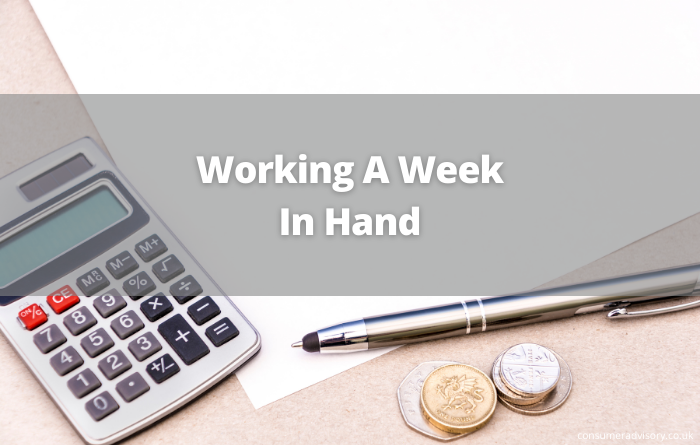
If you are asked to work a week in hand, this means that you’ll work for a week before you get paid for it. So, you’re being paid for your work the week after you have completed it. This means that your salary will always be one week in arrears.
In this article, we’ll tell you everything you need to know about working a week in hand, from the legalities on this subject to whether you can challenge the arrangement.
Working a week in advance, or a week in hand, means that you receive your wages a week after it has been earned. So, if you start work on the 1st January, you wouldn’t be paid for your first week until on or after the 14th January, rather than the 7th as you might expect.
This means that you will always be one week in arrears when you are paid, so your employer will always owe you at least one week of wages. This should be paid upon your resignation from the company.
There are many reasons why an employer might ask its employees to work a week in hand. In fact, this practice is more common in certain types of employment than others. For example, people who are paid hourly or work shifts are more likely to be asked to work a week in hand than those who are salaried employees.
It’s not uncommon for employers to ask new starters to work a week in hand as part of their probationary period. This is because it gives the employer a chance to assess whether the new employee is a good fit for the company, and also allows the new employee to assess whether they are happy with the role and the company.
If you’ve been asked to work a week in hand, you might be wondering whether this is a legal request. The answer to this question is, unfortunately, a little bit complicated.
Generally speaking, it is legal for an employer to ask its employees to work a week in hand. However, there are some exceptions to this rule. For example, if you are a member of a trade union and the union has negotiated a collective agreement which states that you must be paid for your work on a particular date, your employer is legally obliged to comply with this agreement.
If you are not a member of a trade union, and you have not negotiated an agreement with your employer regarding pay, then you may be asked to work a week in hand. However, it is worth noting that you can challenge this request, although your employer may not accept the challenge.
You should check your contract of employment for the exact terms of your payroll. It is important that you carefully read and understand this contract before signing, as you will be bound by the terms of this contract during your employment.

If you are working a week in arrears, this means that your wages are paid one week after they have been earned. So, if you begin working on the 1st March, your employer will pay you for the work during the week of 14th March, a week after it has been earned.
It’s important to note that working in arrears is different to being paid late. If you are paid late, this means that your employer has not paid you on the date which was agreed. For example, if your wages are normally paid on a Friday but you don’t receive them until the following Monday, this would be considered as being paid late.
If you are paid in arrears, this means that your employer is still paying you on the date which was agreed, but for work which has been completed in the previous week.
As with working a week in hand, the legality of working in arrears depends on your contractual agreement with your employer. If you have negotiated an agreement which states that you will be paid on a particular date for work which was completed during the previous week, then your employer is obliged to comply with this agreement.
If you have not negotiated an agreement with your employer regarding pay, you may be asked to work in arrears. However, it is worth noting that you can challenge this request, although your employer may not accept the challenge.
You should check your contract of employment for the exact terms of your payroll. It is important that you carefully read and understand this contract before signing, as you will be bound by the terms of this contract during your employment.
There is no law that sets out whether an employee must work a week in hand before being paid. It is completely down to the individual employer to decide the terms of payroll.
However, when and how an employee will be paid should be set out in their contract of employment, so the employee understands when they will be paid and the method of payment. If working a week in hand is expected, this should be clearly explained in the contract of employment.

If you have worked a week in hand, you might be wondering whether you will receive this payment when you resign from your post, especially if you resign with immediate effect.
If you decide to resign with immediate effect, it is important to understand that you will not be paid for your notice period. This is because you have not worked during this period, so you are not entitled to payment.
However, you should be paid for your week in hand, as this is time that you have worked and money that you have already earned. Therefore, you are legally entitled to this payment, and should receive it upon leaving the company.
When you are working a week in hand, you are essentially working a week in arrears. This means that you are paid for the work you have completed a week after you have completed it. So, your salary is always one week in arrears.
If you are working 2 weeks in arrears, this means that your wages are paid two weeks after they have been earned. So, if you begin working on the 1st March, your employer will pay you for the work completed during the week beginning 21st March.
If you are paid fortnightly, this means that your wages are paid every two weeks. The dates of these payments will be decided by your employee according to their payroll schedule. If you are unsure of when to expect your salary, you should contact your Payroll Department to raise the query.

There could be a number of reasons why an employer might choose to pay their employees a week behind.
One reason could be that the employer wants to ensure that their employees are paid on time, and that there is enough cash flow within the company to cover wages. This is especially important for smaller businesses, as they may not have the financial stability to cover payroll if they encounter any unexpected costs.
Another reason for paying employees a week behind could be that the employer wants to avoid staff leaving the company without notice. If an employee is paid in arrears, they are more likely to stay with the company until their next wage payment, as they will not want to forfeit this money.
Lastly, some employers may choose to pay employees a week behind in order to save on payroll costs. By paying employees a week after they have worked, the employer can spread their wage payments over a longer period of time.
If you only received half of your paycheque, it is likely that your employer has made a mistake with their payroll. This can happen from time to time, and is usually down to human error.
If you think that your employer has made a mistake with your wages, you should contact them as soon as possible to query the situation. They will then be able to investigate and correct the issue.
If you are not able to contact your employer, or you are not happy with their response, you can contact ACAS for advice.
When you resign from your job, you are entitled to any money that you have earned but have not yet been paid. This includes your final salary, any holiday pay that you are owed, and any commissions or bonuses that you are due.
You should receive this money within your final paycheque, unless your employer agrees to pay you differently. If you have any questions about the money that you are owed, you should contact your Payroll Department.
If you are made redundant, you are entitled to a number of different payments from your employer. These include your notice pay, your redundancy pay, and any holiday pay that you are owed.
You should receive all of this money within your final paycheque, unless your employer agrees to pay you differently. If you have any questions about the money that you are owed, you should contact your Payroll Department.
It is not usually possible to get paid in advance, as your employer will need to wait until you have worked the required number of hours before they can process your wages.
However, there may be some exceptional circumstances where your employer is able to give you an advance on your wages. The best thing to do is to contact your company’s HR department and discuss your request in confidence.
If you are in financial difficulty and struggling to make ends meet, you may also be able to get an advance on your Universal Credit payments. You can find out more about this by contacting the Department for Work and Pensions.
If you are unsure why you haven’t been paid, the first thing you should do is contact your employer. They will be able to tell you if there has been a mistake with your wages, or if there is a reason why you have not been paid.
If you are still not happy with your employer’s response, you can contact ACAS for free, impartial advice.
Whilst working a week in hand is not as common as it once was, it remains something that is practised by many UK employers, especially for employees who are paid on an hourly basis. In this article, we have explained everything you need to know about working a week in hand, from when you might be paid in this way to whether you will be paid for your week in arrears when you resign from your position.
Copyright © 2025 Consumer Advisory. All rights reserved.